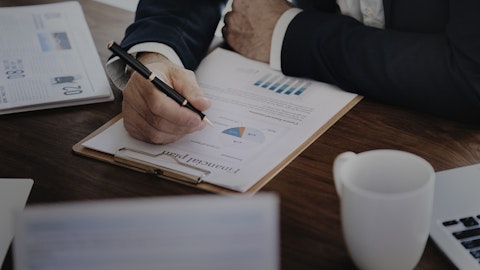If Turkey continues on this path, we do have this upside that will be coming along from Turkey.
Patricia Bueno: Thank you, Ignacio. Next question, please.
Operator: The next question is from Marta Sanchez Romero at Citi. Please go ahead.
Marta Sanchez Romero: Thank you very much. My first question is on the structural hedging in Spain. So you’ve got EUR39 billion of ALCO portfolio. Are you expecting to increase that over time, or is that the end target? And then if you could add any color on receiver swaps that you may have, that would help us with our model. So, any receiver swaps that you’ve added in your book. And on capital, the — I think Onur mentioned plans to generate 60 basis points of capital per year organically after dividends. But this year, you’ve only generated 14 basis points, even if I strip out the EUR1 billion share buyback last year. So, my question here is, are you expecting any other recalibration of models that you’ve been doing to get back to you in 2024? Are you working on the optimization of internal models that would release some risk-weighted assets? And related to this sorry — the impact of recalibration that we’ve seen this year would be very helpful. Thank you.
Onur Genc: On the first one on ALCO?
Luisa Gomez Bravo: Okay. Well, as I mentioned before, we are looking at the size of the ALCO book to be reasonably the one that we would like to have. We may be ending the year at this level or slightly above, depending, again, on the rate levels, and if we find opportunities to renew maturities at these levels or not. And obviously, yes, again, depending on the dynamics of the customer fund evolution in the year. With regards to the swaps, I think that aside from the hedges that we have on the ALCO books, primarily, as you know, we hedge the mortgages. Around 30% of retail mortgages are currently a fixed rate. And out of the 70% floating rate mortgages that we have, we have hedges in place for around 45%, 50% of the book. And therefore, we do have some hedging in place on the mortgage book that we again, dynamically manage going into the year.
Onur Genc: Very good. On the second question, which is a very precise, very right question. Marta, thank you for the question. First of all, I mean, at the surface, we have reduced the — capital of the bank has been reduced by 13 basis points. The share buyback of EUR1 billion is 32 basis points, 32 plus — minus 13, it’s 19 basis points. So 19 basis points is what we have organically created, as it seems on the surface. But if you remember when we said the 60 basis points, organic capital generation, we always said it excludes two things, regulatory impacts in model updates and also the M&A. We didn’t do any M&A, but in the year there were, if you remember, in the first quarter, we told you at the time there was a 20 basis points regulatory impact in the models.
And in the fourth quarter, we discussed it as I was going through the presentation, there was this annual model update, and this year it produced more than usual negative impact on the capital figures, which was around 20 basis points. When you add the 19 basis points, plus the 20 basis points that you have seen in the first quarter, plus the model updates, again, we are not expecting in the coming years that the annual update will produce as much. But when you add this year’s number of around 20 basis points, you get to 60 basis points. And that’s our guidance for next year as well. We are — when we look into our numbers, the organic capital generation, excluding regulatory impact and model updates, excluding M&A should be around 60 basis points.
Patricia Bueno: Thank you, Marta. Next question, please.
Operator: Our next question is from Fernando Gil from Bestinver. Please go ahead.
Fernando Gil: Hi, thank you for taking my questions. Three quick ones, please. First one is, can you please update on the unrealized losses, on the hold-to-collect portfolios? I think in Q3 it was less than 250 basis points of tangible book. The second one would be, can you please comment on asset quality and Stage 2 increases we saw in Q4? And finally, the last one is, are you going to plan do an Investor Day during this year for the next three years? Thank you.
Onur Genc: Very good. Let’s do it very quickly because we are running out of time a bit. The unrealized losses in the hold-to-market — hold-to-maturity books is around EUR400 million, EUR400 million very low as compared to many other banks out there, and it’s mainly Turkey, by the way. And then the Stage 2 on the Q4, the increase in the Stage 2, it’s mainly because of the — if you go country by country, it’s mainly because of the mortgage portfolio in Spain, given their variable rate mortgages and so on, we did help our customers in the last few quarters on restructuring their mortgages, and we do apply new definition of default into those portfolios. When you do the restructuring, although the customer is fully fine and paying and so on, the fact that you do the restructuring takes them to the Stage 2 or Stage 3, even in certain cases.
This is also one of the reasons why the coverage has come down a little bit because it’s mainly the increase in the NPLs also is mainly because of the mortgage portfolio, which typically are covered, as you know, I mean, the LTV of our mortgage portfolio in Spain is 42%, if I’m not mistaken, around 40%. So, these are very nicely covered portfolios. But given the fact that we are helping our customers, our accounting obviously implies that we had to increase the Stage 2s, 3s and which then also implied lower coverage. Investors Day, we are planning for it, yes, in the coming years. We are in the process of thinking about it, on when, and how. We will be updating you when we clarified it. But the last time that we did it was three years ago. We will be recapping what we have achieved versus the goals that we have set.
And yes, we are planning to do it probably in the first quarter of next year. That’s the current thinking, but we will update you when it’s finalized.
Patricia Bueno: Thank you, Fernando. Next question, please.
Fernando Gil: Thank you.
Operator: Our next question is from Carlos Peixoto from CaixaBank. Please go ahead.
Carlos Peixoto: Yes. Hi, good morning. A couple of questions from my side, a bit of a follow-up, actually. So, on Turkey, the question would actually be, you do flex or you do mention in your guidance that deterioration in cost of risk to around 110 basis points, but you expect net profit contribution to remain broadly stable. I was wondering if you could shed some light on the main drivers of setting the date back from a higher cost of risk. And then the second was a follow-up on what Luisa mentioned on Argentina. When you — I believe you mentioned the contribution to net profit should be something like 30% lower than this year, but this would be in constant euros, and then you mentioned that Argentinean peso you’re expecting it to rate to 15.42. So around 42% devaluation, if I’m correct. So, should we flex or should we pause, we put this on top of the 40% drop you were mentioning before, or how should I look at it? Thank you very much.
Onur Genc: Well, maybe on the second one, very quickly. It’s in current euros.
Luisa Gomez Bravo: Yes.
Onur Genc: It’s in current euros. And just to be very clear, and some of you also write this in your reports and so on complication of understanding. So in the hyper countries, it’s very simple for us. We always look into current euros, current euros. Okay? So the number that you see is the final number. So, in the case of numbers that we talked about the profits of Argentina and so on, current euros. Cost of risk in Turkey, you’re saying with the higher cost of risk, how come Turkey will deliver more or less the same profit? The answer is in the customer spread. We have seen the bottom, in our view, in the fourth quarter, and the customer spread will continue to improve in the coming year. Anything? Anyone else? Are we done?
Patricia Bueno: No. There is another question. Thank you, Carlos. Next question, please.
Operator: Our last question comes from Hugo Cruz from KBW. Please go ahead.



